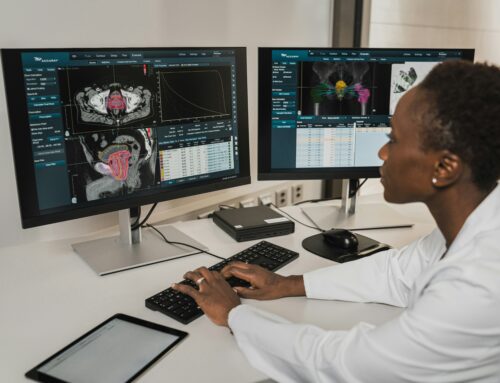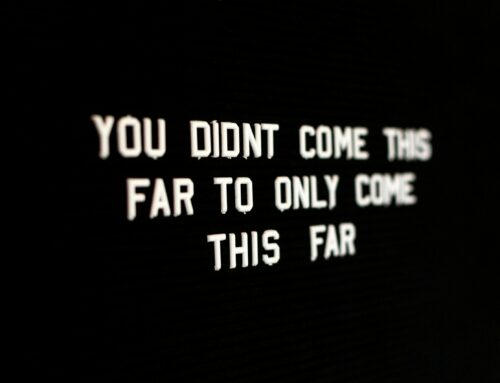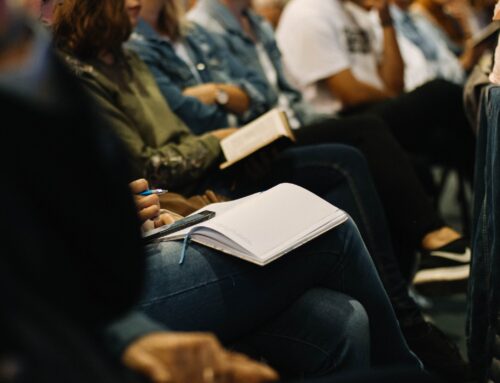Sharing cancer stories is a meaningful way to raise awareness around the disease. By discussing their cancer journeys, patients and survivors can shed a light not only on the illness, but also on the less known issues that come with it. This kind of conversation on the difficulties associated with cancer benefits both the newly diagnosed and the larger community (whether they are cancer patients, survivors, caregivers, or people otherwise impacted by cancer).
By speaking up about their experiences with cancer, patients affect every person coming across their stories. They can provide a better understanding of how cancer impacts one’s life. They can also promote hope, empathy, and a sense of connection with other people who have cancer, helping the sharer as much as the listener.
Despite recent improvements in treatment and survival, cancer is still linked with strong negative connotations. Often, sharing the news of a cancer diagnosis elicits reactions of silence, awkwardness, fear, and grief. Therefore, cancer patients may feel isolated and not supported by those close to them, causing emotional suffering. Cancer by itself can hugely impact mental health: for example, depression and anxiety are common symptoms among cancer patients, emerging not only when receiving a diagnosis of cancer, but even in survivors when ending treatment.
As cancer affects the body as well as the mind and spirit, also its treatment should address these elements. The inherent dependency between mental and physical health makes it crucial for cancer patients to be able to access not only the most appropriate cancer treatment, but also the necessary supportive care.
Sharing cancer stories may be a first step to foster healthy conversations around this topic. Therefore, today we leave the floor to our project partner Tom Flynn, Innovation and Business Development Manager at TFC, for him to share his story.
Meet TFC Research and Innovation
At TFC, as an engaged scientific research company, we are involved in many challenging European projects. We participated across different themes, such as SME energy efficiency, mass casualty, security, materials, standardisation, artificial intelligence, and eHealth. The company brings fresh, lateral, and innovative thinking to projects, as well as project management, standardisation, and outreach skills. TFC has helped many organisations to successfully win with their project proposal.
One of them is the FAITH project, which in particular means a lot to the company, since it is a chance to give something back. The Innovation and Business Development Manager is Tom Flynn. Here he tells his story.
I am a survivor: twice I successfully battled cancer. During post-cancer care, I battled mental and physical fatigue, and utter exhaustion while primarily preparing a research project proposal for the European Commission. It won ‒ 15/15. I know the impact that cancer and post-cancer can have. I suffered emotional disorder, memory loss, severe haemorrhaging, and a lot more. But I am alive, and I survived! Now, I want to share my story and its connection with the FAITH project. I hope that much good will come from this Artificial Intelligence and Federated Learning project for those who, at some point in the future, will suffer, and for those who care.
How I realised that I had cancer
I was in denial. Trips to the convenience room were frequent during the night. You convince yourself that the caffeine intake that day was on the high side, and that was the only reason you had to get out of the bed so many times. The denial continues, night after night, and the days and weeks become months. In fact, my denial went on for long, but then inevitably that visit to the doctor became a reality. I took blood tests (i.e. prostate-specific antigen level checks – lads, get them done!) “just to be on the safe side”, as the Doc said, adding “it’s probably nothing to worry about”.
Then, some days later that phone call came from the Doc. I had never received a phone call from a doctor before, and my brain and emotions before he spoke were in overdrive. When you get a call from the doctor, you know that trouble lies ahead – and there was!
A couple visits later to the Mater hospital in Dublin and it is confirmed. I have prostate cancer. My mind for a while is in turmoil – more of a delayed aftershock impact – and my legs become jelly; but later, and thankfully, calm clarity kicks in, and my battling mind and spirit take over. I might be vulnerable but bring it on ‘Mr. Bass-tt-ard’ – as I politely named my cancer! Give me your best shot – but you will never, ever, have my life. So, with wonderful urology consultants at the Mater hospital and their great team the fight for my life began.
How I managed to beat cancer
Mental strength was essential, and having a positive outlook was critical in the process. The prostate cancer made me, for the first time ever, put my life in someone else’s hands. That consuming thought dwelled on my mind for a while and consumed my emotions. Inwardly, it was scary; but I stayed strong, although naturally nervous, and prepared for my fight with ‘Mr. Bass-tt-ard’. I had radical surgery. The recovery process took its toll physically, but mentally absolutely not. At least, not at the initial stage of the process.
Being always positive and wanting life was key. It drove me through this. Mental health can be damaged in the post-cancer phase. In addition, home bed rest was mandatory as my body was physically so weak. Thereafter, a healthcare nurse visiting my family home was necessary, and I will always be truly grateful for this. Family and friends’ support was truly great! Never underestimate that simple phone call, WhatsApp message, or visit.
There were dark moments, but you have to dig deep to battle through it. Encouraging words, the memory of a visit, and those WhatsApp messages just spurred me on. Mentally, I was strong and ready for what life would throw at me. I battled with brilliant surgeons on one side and my inner spirit on the other. Collectively, we beat the cancer. I was back!
My second encounter with cancer
Years later, however, ‘Mr. Bass-tt-ard’ wanted another shot. And so, another battle began. This time, it attacked my lymph node system, and something also showed up on a bone. A combination of radiotherapy treatment in St. Luke’s (Beaumont, Dublin) and hormone injections, taken once every three months, did it. The cancer was defeated, although it took its toll on me. The hormone injections continued. Their side effects affected me ever so badly. I will not discuss this, but a word of caution: know the full story on how hormone injections can affect you. Best to do your homework, before agreeing to go on an injection programme. This way, you will be sure that the recommendations you receive are the right ones for you.
I love life. I stayed mentally strong as best as I could while battling the impact of those injections. My emotions were all over the place. Physical and mental fatigue and exhaustion were just some of the negative features that I endured, and for some time too. Finally, I took the decision to come off the injections. It was my call, after all.
It took over two years before I felt back to being “me”, and it might sound strange, but it was not easy. Notwithstanding that, genuine friendship, phone calls, WhatsApp messages and visits are priceless when you battle for your life. Relationship with my urologist and the team is great to this day. Thanks team!
Suffering from negative emotions
It’s hard to understand so many combined emotions and overwhelmed feelings, when you are fighting for your life. At times, I felt so frustrated because I’m a very active person and cancer drained the energy from me. Also, I had to overcome so many physical and mental issues to become “me” once again.
I felt vulnerable, and I was anxious about those follow-up appointments. I also started questioning my values and reasons for being here. But I need to say that family, genuine friends, a positive outlook and habits – including physical exercise – played a major role in preventing negative emotions and thoughts from taking my life to a dark place. It can happen. You only understand it properly when you have been there.
How cancer changed my life
Cancer gave me time to revisit the state of my life. It let me see life differently. It is precious and can be so wonderful! Family and genuine friends mean the world to me. Those simple things, like a walk in a park or a visit to the wonderful Curracloe beach, today mean more than ever.
I must admit that I’m much stronger than I was before. Personally, I think that this is due to the fact that I know my weak points better now than before cancer, and I know who my friends are. I have annual appointments with oncologists, I follow some routines that I didn’t use to have before, I’ve changed my diet, but I’m so grateful that I can still talk about a phase of my life. And maybe this blog will help one good person. I believe in FAITH.
Being cancer-free
On both days when I was told that the cancer was gone the sun was out. It was warm, with a light breeze: perfect days for good news. I felt overwhelmed, shaking; yet, relieved. Odd emotions, difficult to explain… but perhaps some readers will get it, as they too have survived it.
However, at the time the hormone injections were still impacting my mental wellbeing. While battling the side effects, I conceived the idea and desire to do something positive to help others to perhaps not go through what I went through. Without the combination of the radiation and hormone injections, perhaps my colleagues would not be writing this blog. Although I did not have depression, the emotional disorder as well as fatigue, both mental and physical, was hard. This, at the post-cancer stage, is where the FAITH project, and other related research projects coming down the line, can help.
We are all individuals, with different strengths and weaknesses; but to each one, FAITH can offer some hope. Depression, if not caught on time, could sadly lead to a worsening situation for the patient, and it can hit at any moment. What FAITH is building is an Artificial Intelligence application to help with the patient’s aftercare support mechanism. This App remotely identifies and analyses depression markers to predict negative trends in mental health. This has the potential to allow the caring team, and healthcare providers in particular, to be alerted with advance warning of the patient condition. Following this alert, they can apply the appropriate intervention for the good of the patient. This could be priceless for some patients! The ultimate goal of the project is helping them achieve a better, improved quality of life.
FAITH: giving back to the community
I ran a personal poster campaign on my cancer experience, which today is having a positive impact on some men, but I wanted to do more. Naturally, doing scientific research was my way forward.
I have a very active and lateral thinking mind, so bringing ideas to the table is what I can do. I contacted TSSG (Ireland) and others organisations, including Uninova (Portugal) and UPM (Spain), to motivate the preparation of an EU proposal based on post-cancer research. TSSG took it to another level, drove it, and FAITH won!
To me, FAITH is an opportunity to give back to the community and help others. Heading up TFC, FAITH gives my team the unique chance to share fresh ideas and initiative with our partners. It also presents an opportunity to get industry clustering, standardisation, and outreach engagement moving in the right direction for cancer survivors. We have a tremendous, committed team and want to make a difference. We battle through FAITH. We are going for it.
Many thanks to Tom Flynn of TFC Research and Innovation (Dublin, Ireland) for sharing his story.




